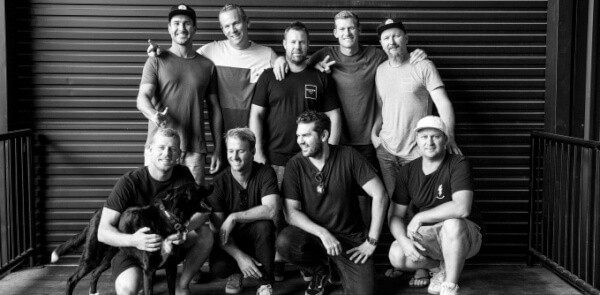
Back row left to right: Joel Parkinson, Sean Ronan, Ant Macdonald, Bede Durbidge, Scotty Hargrave. Front row Left to right: Mick Fanning, Josh Kerr, Stirling Howland, Aza Waters. Source: supplied.
When Australian surfing stalwarts Mick Fanning, Bede Durbidge, Josh Kerr and Joel Parkinson got together in 2016 to create a brewery there was concern that beer drinkers would dismiss them as a gimmick.
But just over two years and more than 20 accolades later, their Gold Coast-based business Balter has been recognised as a mainstay in Australia’s burgeoning craft beer market.
The business took out top gong in a survey of 18,000 craft beer drinkers published by online retailer Beer Cartel last week, topping well-known brands like Pirate Life and Stone & Wood.
It’s confirmation the seven founders, who also include Stirling Howland, Ant Macdonald and Sean Ronan, are now developing a very different type of celebrity.
“I never wanted it to be a surfers’ brewery, it has to be a good beer company,” Howland tells SmartCompany.
“Initially people were just interested in what Mick Fanning, Joel Parkinson, Bede and Josh were doing,” he explains.
“But once people started drinking the beer that interest turned quickly.”
Australia’s craft beer scene has taken off in recent years, buoyed by similar movements towards more boutique and higher quality brewing in the US and UK, as well as interest from younger consumers looking for more premium beer options.
Balter, still relatively new to the market, has quickly become a beneficiary, selling 1.5 million litres of beer in 2017-18.
That figure is expected to almost double to 2.7-3 million litres in 2018-19, as the business ramps up a new line of limited edition beers that Howland believes will take the business into “second gear”.

Head brewer Scotty Hargrave at work. Source: Supplied.
So far, Balter has built its beer castle upon the work of head brewer Scotty Hargrave, who has delivered a popular extra-pale-ale that’s found its way into mainstream liquor stores such as BWS.
The range also includes a strong pale ale, pilsner and IPA, all brewed locally in Australia.
Aside from the ale, and the 50 or so people working at the fast-growing business, Howland says Balter’s success can be attributed to its branding.
Designed with simplicity in mind, Balter has juxtaposed itself from the often extravagant marketing strategies of other craft brewers.
“You come to the balter tap room and you’ll see the young hipster and a 75-year-old couple enjoying beer … that sums up what we’re about,” he says.
Howland believes the inclusive messaging has helped catapult the business into a more mainstream market, especially at a time when Australians are consuming less alcohol.

“I never wanted it to be a surfers brewery, it has to be a good beer company.” Source: Supplied.
Australian Bureau of Statistics (ABS) data released earlier this month shows the average Australian consumed the equivalent of 224 375ml bottles of beer in 2016-17.
“If 224 stubbies sounds like a lot, contrast that with 1974-75 when Australia reached ‘peak beer’ and the consumption was equivalent to over 500 stubbies per person,” ABS’ director of health statistics, Louise Gates, said of the figures.
But for Balter, as well as the dozens of other craft breweries that have popped up across the country in recent years, the so-called ‘good beer movement’ has much less to do with volume than it does quality.

Howland says Balter has opted for a simple and inclusive brand philosophy. Source: Supplied.
Customers are showing up in droves to pay — an often higher price — for locally brewed craft beer, helping catapult brands like Balter, Stone & Wood and Little Creatures into mainstream pubs and liquor stores.
“A lot of Lion or CB [Carlton Brewhouse] taps were 100% owned taps, and then all of a sudden they’re only at 70%,” Howling explains.
“Customers are going: ‘We want good beer here’.”
The larger breweries have responded by buying out a string of successful craft brands in an attempt to get their spot in the wave.

Balter has no plans to sell out to a bigger brewer. Source: Supplied.
Last year AB InBev subsidiary Carlton & United Breweries purchased craft staples Pirate Life and 4 Pines, Coca-Cola Amatil purchased the Feral Brewing Co.
But Howland says Balter doesn’t intend on going down the same route.
“We’re not interested at this point … we’ve got a legacy we want to create and that’s not even in our discussion plans,” Howland explains.
Selling out also risks alienating a consumer base that’s increasingly cautious of where their products are coming from.
Beer Cartel’s recent survey of craft beer drinkers found 57% had changed their purchasing habits after Ab InBev bought out 4 Pines and Pirate Life, including 13% who had stopped purchasing the beers altogether.
At least for now, Howland believes Balter’s growing popularity is enough to support its growth ambitions as the founders look to make their mark on the industry.
NOW READ: Queensland brand renames ‘sexist’ product, but the fallout shows a deeper problem


COMMENTS
SmartCompany is committed to hosting lively discussions. Help us keep the conversation useful, interesting and welcoming. We aim to publish comments quickly in the interest of promoting robust conversation, but we’re a small team and we deploy filters to protect against legal risk. Occasionally your comment may be held up while it is being reviewed, but we’re working as fast as we can to keep the conversation rolling.
The SmartCompany comment section is members-only content. Please subscribe to leave a comment.
The SmartCompany comment section is members-only content. Please login to leave a comment.